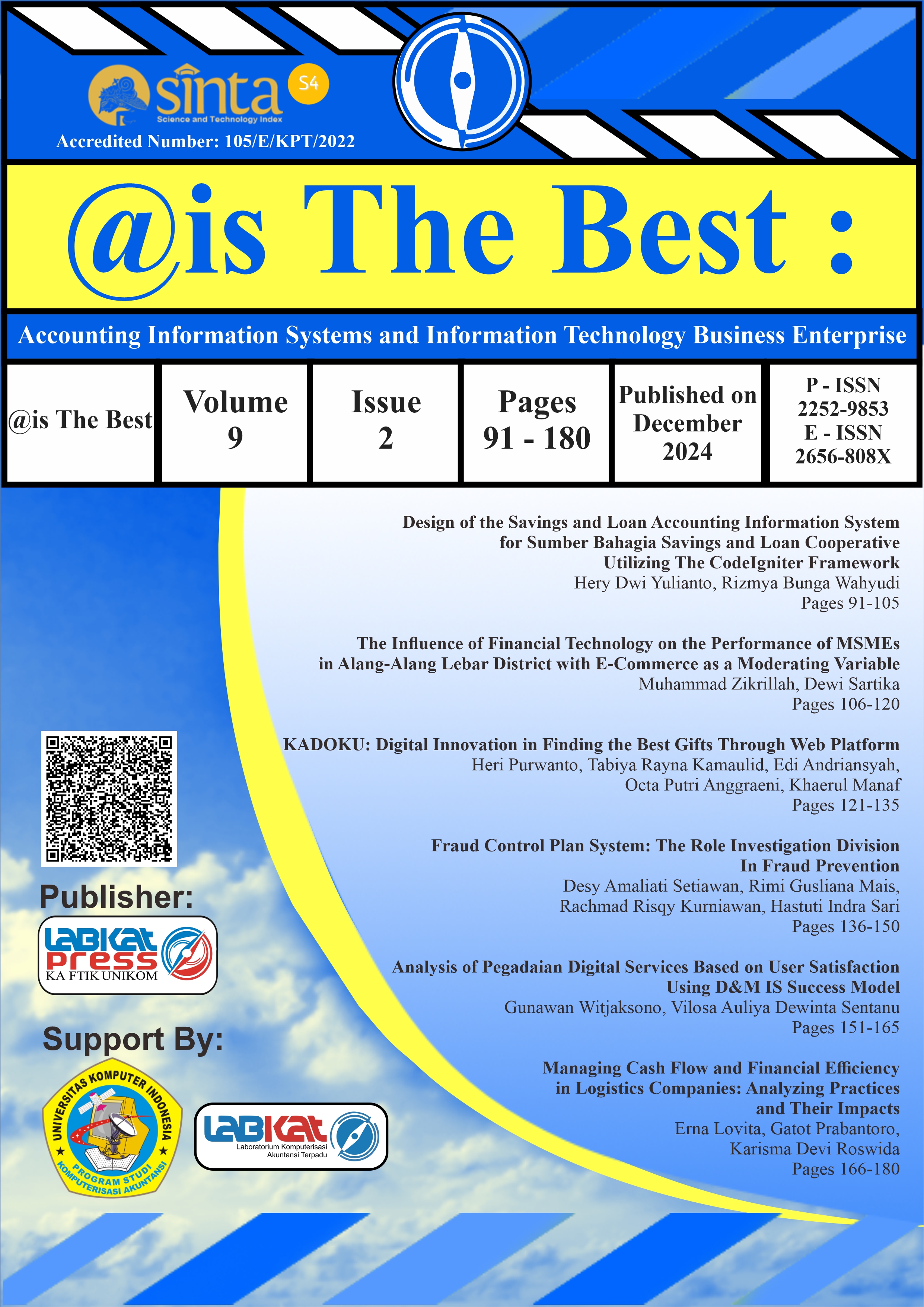Fraud Control Plan System: The Role Investigation Division In Fraud Prevention
Main Article Content
Abstract
The Financial and Development Supervisory Agency (BPKP) has an important and vital role in preventing corruption and fraud to create good governance that can be implemented in all government agencies. BPKP has made integrated efforts to prevent fraud and corruption, but in its implementation, there are still obstacles so that the achievement is considered less than optimal. This study aims to see the role of the Investigation Division of BPKP in preventing fraud by using the Fraud Control Plan (FCP) which consists of 10 attributes, namely: anti-fraud policy, anti-fraud structure, standards of behavior and discipline, fraud risk assessment, human resource management, third party management, whistleblowing system, proactive detection, investigation, and corrective action by conducting socialization of the use of FCP, diagnostic assessment, technical guidance, and evaluation. This study is a type of qualitative research, with data collection: interviews, observations, and documentation. Interviews were conducted with 3 key informants of BPKP Jakarta employees who work in the Investigation Division. The results of this study indicate that the Investigation Division has intensified fraud prevention by using the FCP. However, there are still agencies that are less concerned about this. The BPKP Investigation Division, by using the Fraud Control Plan, hopes to provide a major role and impact on fraud prevention, by mitigating, and facilitating the disclosure of fraudulent actions and it is recommended that every agency use and implement it to create an anti-fraud environment.
Downloads
Article Details
Section

This Journal is licensed under a Creative Commons Attribution-ShareAlike 4.0 International License
How to Cite
References
Association of Certified Fraud Examiners (ACFE), “Occupational Fraud 2022: A Report to the nations,” Assoc. Certif. Fraud Exam., pp. 1–96, 2022.
R. G. Mais and F. Nuari, “Pengaruh Good Corporate Governance, Ukuran Perusahaan, Dan Leverage Terhadap Integritas Laporan Keuangan,” J. Reviu Akunt. dan Keuang., vol. 6, no. 2, pp. 907–912, 2017, doi: 10.22219/jrak.v6i2.02.
M. Amin Iskandar and R. Yuniasih, “Development of a Fraud Risk Control Policy Framework for Public Sector Organizations,” Adv. ini Econ. Manag. Res., vol. 89, pp. 303–311, 2019, doi: 10.2991/apbec-18.2019.40.
S. Tjahjono, Business Crimes And Ethics Konsep dan Studi Kasus Fraud di Indonesia dan Global. Yogyakarta: Penerbit Andi, 2013.
C. D. Hadi, “Peran Badan Pengawas Keuangan Dan Pembangunan (Bpkp) Perwakilan Jawa Timur Terhadap Pencegahan Korupsi,” J. Ilm. Mhs. FEB, vol. 8, no. 1, 2019.
I. M. Francesco and H. Hastuti, “Pengaruh Penerapan E-Procurement Dan Sistem Pengendalian Internal Pemerintah Terhadap Pencegahan Fraud Pengadaan Barang/Jasa Pemerintah (Survei pada Pejabat Pengadaan di Kota Cimahi),” Indones. Account. Res. J., vol. 2, no. 3, pp. 237–243, 2022.
D. Wicaksono and I. Yuhertiana, “Case Study: Evaluation Of Fraud Control Plan (Fcp) Attributes As Fraud Prevention Tool,” Natl. Conf. Account. Audit., vol. 1, 2020.
D.- Pangaribuan, “Governance Practices Government, Of Accountability Performance And Implementation Of Risk Management And Implications For Fraud Detection And Prevention,” Int. J. Contemp. Account., vol. 1, no. 2, pp. 75–98, Feb. 2020, doi: 10.25105/ijca.v1i2.6167.
Karyono, Forensic FRAUD. Yogyakarta: Penerbit Andi, 2013.
D. Kristiyani Hamidah, “Model Penerapan Akuntansi Sektor Publik Untuk Mencegah Fraud Pada Sektor Publik Di Era Digital,” 2020.
W. Halim and R. G. Mais, “Implementasi Manajemen Risiko dalam Penentuan Objek Audit Kepabeanan dan Cukai,” J. Akunt. dan Manaj., vol. 17, no. 02, pp. 69–84, 2020, doi: 10.36406/jam.v17i02.346.
H. D. P. Mukhlis Erisnanto, “Violation Reporting System As The Implementation Of Fraud Control Plan In The Public Sector (A Study at Dr. Moewardi Hospital),” Asia Pasific Fraud J., vol. 03, no. 02, pp. 307–318, 2018.
A. Tagora and V. T. Putriana, “Indonesian Treasury Review Mekanisme Dan Implementasi Fraud Control Plan: Studi Kasus Pada Rumah Sakit Umum Daerah,” J. Perbendaharaan, Keuang. Negara dan Kebijak. Publik, vol. 7, no. 2, pp. 133–144, 2022.
T. M. Tuanakotta, Audit Kontemporer, 3rd ed. Jakarta: Salemba Empat, 2017.
W. Aswandi, J. A. Program, and S. S1, “Pengaruh Kompetensi SDM, Pemanfaatan Teknologi Informasi Akuntansi Dan Pengawasan Terhadap Kualitas Laporan Keuangan Sektor Publik (Studi Empiris pada Organisasi Nirlaba di Kota Padang),” J. Akunt. Progr. Stud. S1 Fak. Ekon. Univ. Negeri Padang, vol. 6, no. 1, pp. 1–14, 2018.
W. A. Kuncara, “The Influence of Whistleblowing System and Internal Control on Fraud Prevention at PT Pos Indonesia (Persero) Bandung City,” Int. J. Financ. Accounting, Manag., vol. 4, no. 2, pp. 101–113, Sep. 2022, doi: 10.35912/ijfam.v4i2.250.
Sugiyono, Metode Penelitian Kualitatif (Untuk penelitian bersifat: eksploratif, enterpretif, interaktif dan konstruktif), 5th ed. Bandung: ALFABETA, 2022.

